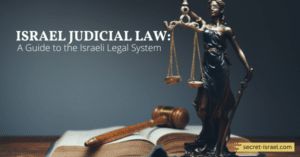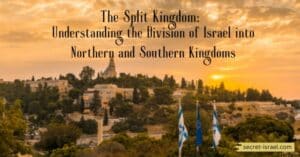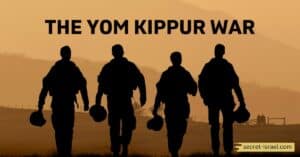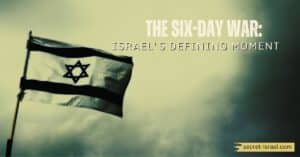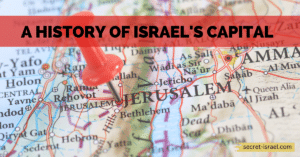Israel’s holidays showcase its rich heritage and cultural diversity. From significant Jewish observances like Passover and Hanukkah. National celebrations such as Independence Day, these festivities bring communities together, symbolizing unity, remembrance, and celebration. They embody the enduring spirit of the Israeli people and their deep connection to their land and traditions.
Discovering the history and culture of Israel through its holidays is a great way to gain insight into this fascinating country. Read on for an overview of the holidays celebrated in Israel!
Holidays in Israel and Their Importance
Israel is a country steeped in history and tradition, and the holidays celebrated throughout the year are an integral part of that heritage. There are numerous holidays that are observed in Israel, ranging from those with religious significance to those that reflect the nation’s culture and history.
Each holiday has its own unique traditions, whether it be lighting candles, exchanging gifts, or feasting with loved ones. Some of the most important holidays observed in Israel include Yom Kippur, Passover, Hanukkah, Independence Day, and Shavuot.
These holidays are not only significant to those who observe them for religious or cultural reasons but also serve as an opportunity for the entire nation to come together to celebrate their shared history and identity.
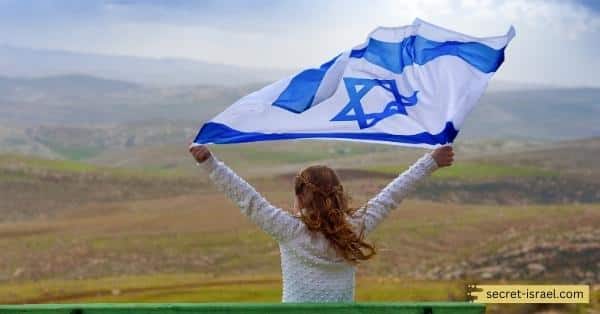
Jewish Holidays
Israel is a country steeped in rich cultural and religious traditions. With the Jewish holidays being some of the most significant ones celebrated each year. These holidays are rooted in history and tradition and are an important part of Jewish culture worldwide.
Passover (Pesach)
A significant Jewish holiday in Israel. Commemorating the liberation of the Israelites from slavery in ancient Egypt. It is celebrated with a festive meal called the Seder, during which the story of the Exodus is retold, and matzo (unleavened bread) is eaten.
Rosh Hashanah
Is the Jewish New Year, observed in Israel and worldwide. It is a time of reflection, repentance, and renewal. Special synagogue services are held, and traditional foods such as apples dipped in honey symbolize a sweet and fruitful year ahead.
Yom Kippur
Known as the Day of Atonement, is one of the most solemn and important holidays in the Jewish calendar. It is a day of fasting, prayer, and introspection. During which Jewish people seek forgiveness for their sins and reconcile with God. In Israel, Yom Kippur is observed with nationwide fasting and quiet reflection, as the country comes to a virtual standstill.
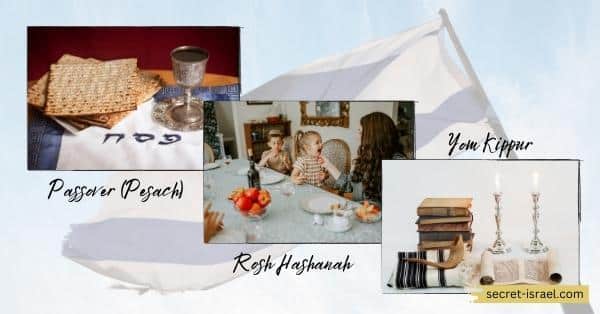
National Holidays
Hold deep cultural and historical significance, reflecting the country’s identity, milestones, and values. These holidays unite the Israeli population, fostering a sense of patriotism and collective memory.
Independence Day (Yom Ha’atzmaut)
A day of exuberant celebration, commemorating the establishment of the State of Israel. Vibrant festivities, including fireworks, concerts, and parades, fill the streets as Israelis express their joy and gratitude for their homeland.
On Memorial Day (Yom Hazikaron)
The nation pauses to honor and remember the brave soldiers who sacrificed their lives defending Israel and the victims of terrorism. Solemn ceremonies, including memorial services and moments of silence, allow Israelis to pay their respects and reflect on the profound impact of their fallen heroes.
Jerusalem Day (Yom Yerushalayim)
Celebrates the reunification of Jerusalem during the Six-Day War. The day serves as a reminder of the historical and religious significance of the city to Jewish people. Festivities include religious services, parades, and public gatherings, showcasing the unique cultural tapestry and diverse heritage of Jerusalem.
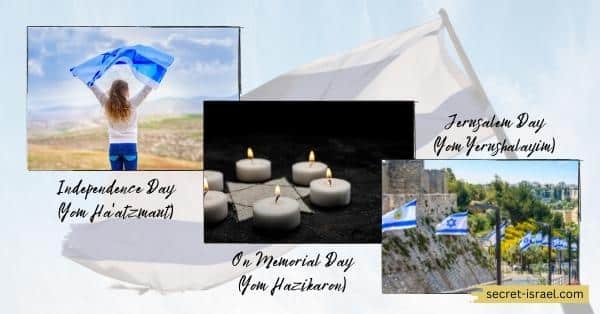
Religious Observances
Celebrates many religious observances throughout the year. At the core of these observances are the Jewish holidays, which mark the milestones of the Jewish calendar.
Shabbat
Shabbat is the Jewish day of rest and is observed every week from Friday evening to Saturday evening. It is a time of religious observance and reflection, with families gathering for festive meals, attending synagogue services, and refraining from work and other activities. In Israel, Shabbat is widely observed, with many businesses and public services ceasing their operations during this time.
Hanukkah
Also known as the Festival of Lights, is an eight-day Jewish holiday commemorating the rededication of the Second Temple in Jerusalem. It is observed in December and involves lighting the menorah (a nine-branched candelabrum), playing dreidel (a spinning top), and enjoying traditional foods like latkes (potato pancakes) and sufganiyot (jelly-filled doughnuts). In Israel, Hanukkah is celebrated with festive menorah lighting ceremonies, public menorah displays, and various cultural events.
Sukkot
Also called the Feast of Tabernacles, is a week-long harvest festival in Judaism. It commemorates the biblical journey of the Israelites through the desert after the Exodus from Egypt. During Sukkot, temporary booths called sukkahs are built, and meals are eaten inside them.
The holiday also involves waving the lulav and etrog (a bundle of palm, myrtle, and willow branches, along with a citron fruit) as a symbol of gratitude and unity. In Israel, Sukkot is celebrated with festive processions, outdoor meals, and lively gatherings in sukkahs across the country.

Cultural and Commemorative Holidays
Provides an opportunity to honor significant events, traditions, and communities, reflecting the diverse cultural fabric of the country. These holidays celebrate historical milestones, and cultural practices, and foster a sense of unity and appreciation among the Israeli population.
Holocaust Remembrance Day (Yom HaShoah)
A solemn occasion dedicated to remembering the six million Jewish victims of the Holocaust. Through commemorative ceremonies and educational programs, Israelis pay tribute to the lives lost, ensuring the remembrance of this dark chapter in history and fostering a commitment to never forget.
Mimouna
Originating from the North African Jewish community is a vibrant cultural celebration held at the conclusion of Passover. It serves as an occasion for friends, neighbors, and families to come together, sharing traditional sweets and pastries, while promoting themes of hospitality, friendship, and the start of the spring season. Music, dancing, and open homes contribute to the festive atmosphere of Mimouna.
Tu BiShvat
The Jewish New Year of Trees or the “Festival of Trees,” highlights Israel’s ecological and agricultural roots. This holiday, celebrated in January or February, encourages environmental awareness and sustainability. Israelis participate in tree-planting events, engage in ecological reflection, and enjoy fruits and nuts native to Israel, fostering a deep connection to the land and promoting conservation efforts.
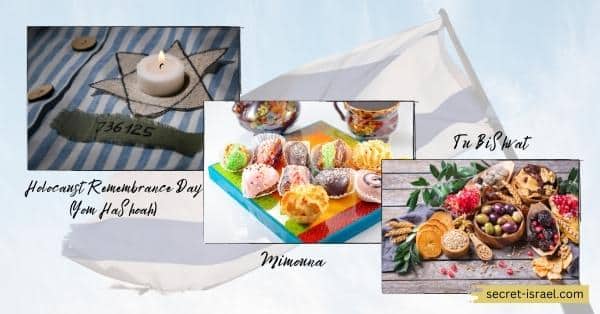
In conclusion
Israel is a nation that is rich in culture and tradition, which is reflected in the various holidays that it celebrates. The country recognizes both secular and religious observances that are important to the Jewish people and the wider population.
Some of the most important holidays in Israel include Yom Kippur, Passover, Hanukkah, and Independence Day. These celebrations are marked by various customs and traditions, such as fasting, lighting candles, eating special foods, and attending community events.
These holidays provide a unique insight into the rich history and heritage of Israel and are a testament to the enduring spirit of its people. As a modern and diverse nation, Israel continues to evolve and embrace new traditions while also honoring the customs of the past.



